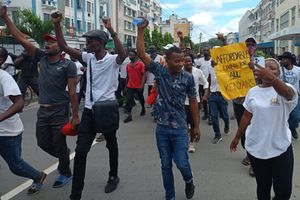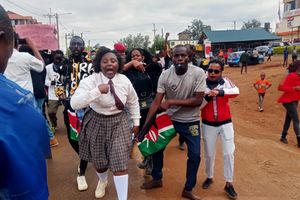
President William Ruto addresses the nation at State House, Nairobi on June 26, 2024.
President William Ruto's establishment of a National Multi-Sectoral Forum (NMSF) to engage with stakeholders and address youth concerns has created a new platform for dialogue, reflecting Kenya's meandering efforts to resolve its key problems.
For nearly three decades, successive regimes have resorted to the formation of various dialogue teams to address specific concerns.
While some teams have borne fruit, others have only gobbled up taxpayers' money and ended up with recommendations that were either not implemented or their efforts halted by court rulings.
President Ruto is already facing opposition from the youth following his call last Saturday for the formation of the NMSF to address the concerns of young Kenyans (Generation Z) who have been staging successive anti-government protests.
During a media interview with editors at State House Nairobi on Sunday evening, President Ruto agreed to engage Kenya's youth on whatever platform they prefer, not necessarily through the multi-sectoral forum.
Some have called on the Head of State to address their issues on the X space.
“If the young people do not want a multi-sectoral forum and prefer an engagement on X space, I am ready,” the president said.
The President has continued to feel the heat over his pursuit of the NMSF, with the Raila Odinga-led Azimio la Umoja-One Kenya Coalition calling on him to implement the report of the National Dialogue Committee (NADCO) before any further talks.
National Assembly Minority Leader Opiyo Wandayi argues that while dialogue is good for the country, "it is good to demonstrate commitment and good faith whenever there are talks about matters of national conversation".
"Let us see a commitment by the government to have the implementation of NADCO report fast-tracked as a demonstration of good faith and commitment before we can have another dialogue," the Ugunja MP said.
Githunguri MP Gathoni Wamuchomba also said the NADCO report had yet to be debated or adopted in parliament and was "gathering dust on the shelves".
“No wonder we are yet to constitute IEBC. Then came Gen Zs in the struggle; they aroused a national economic concern amidst protests. They (government) again conceded and are planning to form a new multi-sectoral committee. Allow me to call it NADCO 2. I can attest to this: any committee reports that require action by the Kenyan parliament are as dead as a dodo,” the legislator said.
She argues that President Ruto’s multi-sectoral committee will be another stunt “to buy time and scatter the already compounding voice of the disappointed youth of Kenya.”
President Ruto's multi-sectoral forum comes hot on the heels of NADCO, which was formed last year following a truce between President Ruto and Odinga that ended months of violent anti-government protests.
The ceasefire was brokered in Mombasa by Nigerian former President Olusegun Obasanjo.
Before the formation of NADCO, Kenya had gone through months of rigorous campaigning for the implementation of the Building Bridges Initiative (BBI), a product of former President Uhuru Kenyatta's team and that of Odinga ahead of the 2022 general elections.
However, the duo's quest suffered a major setback when the Supreme Court finally put the brakes on the ex-president's bid to make sweeping constitutional changes through the initiative.
President Ruto, Kenyatta's deputy at the time and a fierce opponent of the BBI, said the changes would have led to an all-powerful presidency, while Kenyatta argued that the proposal would promote power-sharing between competing ethnic groups.
The BBI contained clauses that advanced the one-man-one-vote-one shilling revenue-sharing formula that Deputy President Rigathi Gachagua is now vouching for after leading his Mt Kenya region to join Ruto in opposing the BBI initiative in 2021/2022.
The current dialogue teams also mirror the Inter-Parties Parliamentary Group (IPPG) formed in the run-up to the 1997 general election.
At the time, many people were demonstrating in the streets to push for minimal legal reforms.
The IPPG was a coalition of political parties and parliamentarians formed to facilitate political reform and ensure free and fair elections.
The IPPG played a significant role in advocating for constitutional and electoral changes, which led to the amendment of various laws to promote a more democratic and transparent political environment in Kenya.
The group was instrumental in pushing for reforms that paved the way for more competitive and fair elections in the country.
Other past dialogue teams in the country include the Truth, Justice and Reconciliation Commission (TJRC), the Commission of Inquiry on Post-Election Violence (CIPEV), the Constitution of Kenya Review Commission (CKRC) and the National Dialogue and Reconciliation Process (Agenda 4).
The TJRC, for example, was established to investigate human rights violations and other historical injustices that occurred between independence in 1963 and 2008, following the 2007-08 post-election violence that claimed more than 1,300 lives and displaced over 600,000 people.
The Commission's mandate included investigating gross human rights violations, economic crimes, illegal acquisition of public land and other forms of historical injustice.
The TJRC aimed to promote justice, national unity and reconciliation by establishing the truth about past abuses and recommending measures to prevent their recurrence.
The Commission concluded its work by submitting a final report with recommendations for reparations, policy changes and other measures to address the injustices identified.
The Commission of Inquiry on Post-Election Violence (CIPEV), also known as the Waki Commission, was also established in Kenya to investigate the causes and effects of the violence that erupted after the disputed 2007 presidential election.
The Commission was chaired by Justice Philip Waki and was mandated to investigate the facts and circumstances surrounding the violence, identify the roles played by state security agencies and other actors, and recommend measures to prevent future occurrences of such violence.
The Waki Commission's final report, published in October 2008, provided a detailed account of the violence, identified key perpetrators and recommended significant reforms to Kenya's electoral, judicial and security systems.
One of the key recommendations was the establishment of a special tribunal to try those responsible for the violence, failing which cases should be referred to the International Criminal Court (ICC).
On the other hand, the Constitution of Kenya Review Commission (CKRC) was established to review and make recommendations for comprehensive reform of the Kenyan constitution.
It was tasked with conducting a thorough review of the existing constitution, engaging with the public to gather their views, and drafting a new constitution that would reflect the aspirations and needs of the Kenyan people.
Its work culminated in the drafting of a new constitution, which was put to a national referendum.
The process faced several challenges and delays, but ultimately contributed to the promulgation of a new constitution in 2010 that introduced significant changes, including a more decentralised structure of government, improved checks and balances, and stronger protection of human rights.
These teams and commissions have been instrumental in addressing various political, social and constitutional issues in Kenya.
There was also the National Dialogue and Reconciliation Process (NDRP), which was initiated following the 2007-08 post-election violence.
The process was mediated by a panel led by former UN Secretary-General Kofi Annan under the auspices of the African Union.
The NDRP aimed to address the immediate crisis and lay the foundations for sustainable peace and reconciliation in Kenya, leading to the formation of the Grand Coalition Government between then President Mwai Kibaki and Odinga, who was appointed Prime Minister, ending weeks of violent protests.
Following the recent anti-tax protests in the country, President Ruto last Saturday announced the formation of a National Multi-Sectoral Forum (NMSF) that will include religious organisations among other stakeholders to address the concerns of the youth (Gen Z generation) who have been the face of the anti-government anger.
He said all national level umbrella organisations representing the youth, civil society, religious organisations, professional bodies, business organisations, academia, student leadership, majority and minority leaders in Parliament, the Council of Governors and other stakeholders will nominate representatives to form the National Steering Committee (NSC) of the NMSF.







